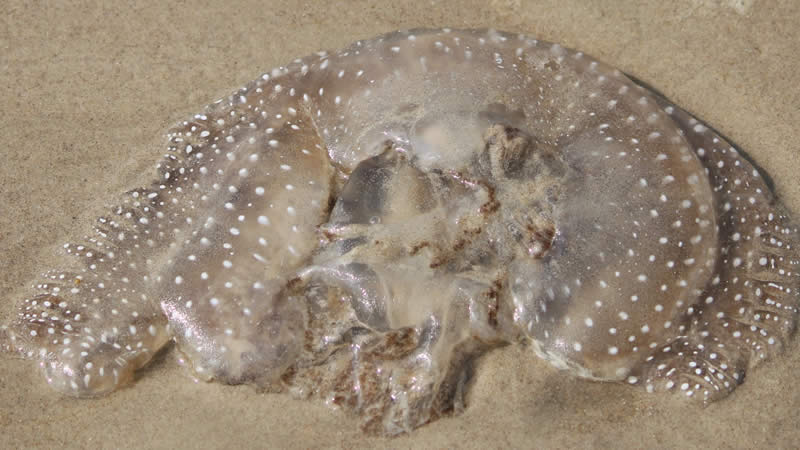A peculiar creature covered in polka dots has recently washed up on a Texas beach, but experts are cautioning against underestimating its seemingly soft and squishy appearance.
The peculiar blob, as described by Padre Island National Seashore in a Facebook post on June 30, is far from a welcome discovery. It turns out to be an Australian spotted jellyfish, a species that has made its way to the Gulf of Mexico from its native Pacific Ocean habitat in recent years.
According to officials, this particular jellyfish species can grow quite large, reaching up to 20 inches in width, and tends to travel in sizable groups. However, unlike other jellyfish varieties, it poses no direct threat to humans. Officials emphasized that its venom is mild, incapable of causing harm or stunning prey.
While these jellyfish may seem harmless, their presence in the Gulf has had adverse effects. The post highlighted that they have been consuming significant quantities of zooplankton, making it difficult for local marine wildlife to find sufficient food.
Therefore, despite their innocuous nature towards humans, the arrival of these large, squishy creatures has disrupted the marine ecosystem in the area.
According to the Texas Invasive Species Institute, experts speculate that the Australian spotted jellyfish may have unintentionally made its way to the Gulf of Mexico by hitching a ride on ship hulls during its polyp stage. Remarkably, these polyps can endure for up to five years before transitioning into the adult “medusa” stage, which typically lasts an additional two years, as explained by the institute.
“In the Gulf, this invader has formed huge swarms in recent years,” the institute said. “Each jellyfish can clear 50 cubic meters (roughly 1,765 feet) of water filled with plankton in one day, making dense aggregations of Australian spotted jellyfish dangerous.”
While the jellies can have a harsh impact on the Gulf’s ecosystem, there isn’t much the average person can do if they come across one.
“The best thing to (do) from an individual’s perspective is to just leave them where you found them” and let nature do the rest, officials said.


